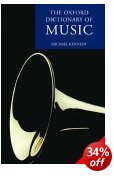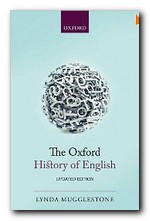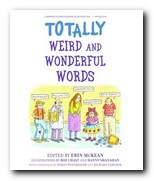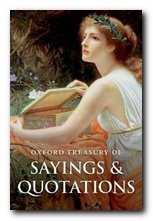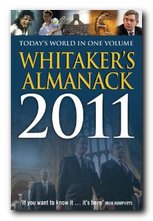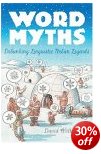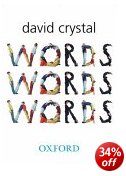Specialist dictionaries have two distinct advantages over conventional reference books. First, they can include far more specialist terms, technical jargon, and explanations of meanings than a normal (average-sized) dictionary. And second, they will help cut down the amount of time you are likely to spend searching for terms. Many of them also include mini-essays on complex topics.
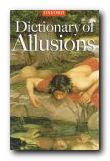 The Oxford Dictionary of Allusions is a guide to and an explanation of cultural references commonly found in writing and arts of all kinds. It covers major issues from the classical period to contemporary mass media – including cinema and television. Topics are listed thematically – dancing, danger, darkness – and all entries are cross referenced in an index. This is an attractive new publication.
The Oxford Dictionary of Allusions is a guide to and an explanation of cultural references commonly found in writing and arts of all kinds. It covers major issues from the classical period to contemporary mass media – including cinema and television. Topics are listed thematically – dancing, danger, darkness – and all entries are cross referenced in an index. This is an attractive new publication.
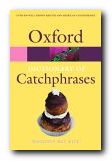 The Oxford Dictionary of Catchphrases is a compendium of famous sayings and expressions from the world of film, radio, television, and the music hall on both sides of the Atlantic. The sort of thing you might recognise in – Can I do you now, sir?, Shut that door!, Who loves ya, baby?, Bono Estente!, and Eat my shorts!. It offers the original sources for the sayings, as well as fascinating background details about the context and sometimes the history of the performer.
The Oxford Dictionary of Catchphrases is a compendium of famous sayings and expressions from the world of film, radio, television, and the music hall on both sides of the Atlantic. The sort of thing you might recognise in – Can I do you now, sir?, Shut that door!, Who loves ya, baby?, Bono Estente!, and Eat my shorts!. It offers the original sources for the sayings, as well as fascinating background details about the context and sometimes the history of the performer.
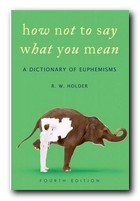 The Oxford Dictionary of Euphemisms is much more than a collection of polite expressions. It’s also a detailed inventory of slang, sexual code terms, metaphors, evasiveness, underworld argot, and indecent language. Topics that invoke euphemism are sex, lavatories, drinking, drugs, crime, and death. The not-so-obvious are commerce, politics, warfare, illness, and ideological belief. Written in a scholarly yet very witty style. Packed with goodies.
The Oxford Dictionary of Euphemisms is much more than a collection of polite expressions. It’s also a detailed inventory of slang, sexual code terms, metaphors, evasiveness, underworld argot, and indecent language. Topics that invoke euphemism are sex, lavatories, drinking, drugs, crime, and death. The not-so-obvious are commerce, politics, warfare, illness, and ideological belief. Written in a scholarly yet very witty style. Packed with goodies.
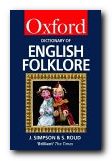 The Oxford Dictionary of English Folklore is a compendium of folklore, beliefs, customs, myths, and superstitions. It covers activities such as cheese rolling, Morris dancing, and well dressing; mythical characters such as Robin Hood, Merlin, Beowulf, and father Christmas; what people believe about parts of the body or days of the week; and beliefs associated with simple items such as plants and hedgehogs.
The Oxford Dictionary of English Folklore is a compendium of folklore, beliefs, customs, myths, and superstitions. It covers activities such as cheese rolling, Morris dancing, and well dressing; mythical characters such as Robin Hood, Merlin, Beowulf, and father Christmas; what people believe about parts of the body or days of the week; and beliefs associated with simple items such as plants and hedgehogs.
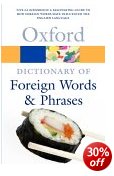 The Oxford Dictionary of Foreign Terms lists 8,000 terms, drawn from over forty countries around the world, that have found their way into the English language. From ab origine to mystagogue and zucchetto. What is the plural of fez? How should we pronounce millefeuille? And where would you see a strabismus?
The Oxford Dictionary of Foreign Terms lists 8,000 terms, drawn from over forty countries around the world, that have found their way into the English language. From ab origine to mystagogue and zucchetto. What is the plural of fez? How should we pronounce millefeuille? And where would you see a strabismus?
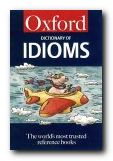 The Oxford Dictionary of Idioms explains the meanings of proverbs, traditional sayings, and metaphorical expressions – such as raining cats and dogs and over the moon. It contains American and Australian as well as UK examples. A date of origin is often given and many entries are supported by illustrative quotations. This will certainly be useful for anybody learning English, as well as for people interested in the oddities of the language.
The Oxford Dictionary of Idioms explains the meanings of proverbs, traditional sayings, and metaphorical expressions – such as raining cats and dogs and over the moon. It contains American and Australian as well as UK examples. A date of origin is often given and many entries are supported by illustrative quotations. This will certainly be useful for anybody learning English, as well as for people interested in the oddities of the language.
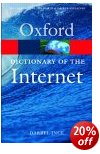 The Oxford Dictionary of the Internet explains the thousands of new technical terms which have come into use via the Net. Includes newsgroup abbreviations, the language of e-commerce, software technology, security, and the arcane language of hackers, whitehats, and alpha geeks. It gains its strength from concentrating in depth on the Internet and its infrastructure, rather than on general computing terms. Comes with CD-ROM.
The Oxford Dictionary of the Internet explains the thousands of new technical terms which have come into use via the Net. Includes newsgroup abbreviations, the language of e-commerce, software technology, security, and the arcane language of hackers, whitehats, and alpha geeks. It gains its strength from concentrating in depth on the Internet and its infrastructure, rather than on general computing terms. Comes with CD-ROM.
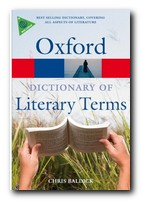 The Oxford Dictionary of the Literary Terms explains the difference between an epic poem and a tragedy, between classical and romantic, between naturalism and realism. The entries range from definitions of the absurd to zeugma, and it is in fact a guide to a mixture of old-fashioned grammatical terms, traditional drama, literary history, and criticism. It contains over 1000 of the most troublesome literary terms you are likely to encounter.
The Oxford Dictionary of the Literary Terms explains the difference between an epic poem and a tragedy, between classical and romantic, between naturalism and realism. The entries range from definitions of the absurd to zeugma, and it is in fact a guide to a mixture of old-fashioned grammatical terms, traditional drama, literary history, and criticism. It contains over 1000 of the most troublesome literary terms you are likely to encounter.
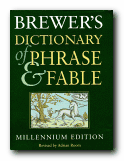 Brewer’s Dictionary of Phrase and Fable is an old classic which lists the meanings and origins of common phrases, sayings, and fables. It also covers both real and mythological people and places. Its unique charm – which has kept it a best-seller for more than a hundred years – is that it is based on a solid foundation of the Greek and Roman classics. Much loved by crossword puzzle fans. Once you start reading, it’s a difficult book to put down.
Brewer’s Dictionary of Phrase and Fable is an old classic which lists the meanings and origins of common phrases, sayings, and fables. It also covers both real and mythological people and places. Its unique charm – which has kept it a best-seller for more than a hundred years – is that it is based on a solid foundation of the Greek and Roman classics. Much loved by crossword puzzle fans. Once you start reading, it’s a difficult book to put down.
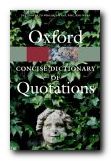 The Oxford Dictionary of Quotations is a compendium of memorable sayings by the witty and famous – from Mae West’s Is that a pistol in your pocket, or are you just glad to see me? to Lytton Strachey’s pithy last words, If this is dying, I don’t think much of it.. Fully cross-referenced. Can serve as a straight work of reference if you are stuck for the source of a famous quotation.
The Oxford Dictionary of Quotations is a compendium of memorable sayings by the witty and famous – from Mae West’s Is that a pistol in your pocket, or are you just glad to see me? to Lytton Strachey’s pithy last words, If this is dying, I don’t think much of it.. Fully cross-referenced. Can serve as a straight work of reference if you are stuck for the source of a famous quotation.
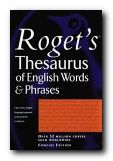 Roget’s Thesaurus is a classic and much-loved reference book. It’s a compilation of synonyms and antonyms – words which mean the same or the opposite of a word you choose. Most people use it to find alternatives for words which they wish to avoid repeating. It can save you hours of head-scratching. So popular that it never goes out of print. A great reassurance for anyone who might feel insecure about language matters.
Roget’s Thesaurus is a classic and much-loved reference book. It’s a compilation of synonyms and antonyms – words which mean the same or the opposite of a word you choose. Most people use it to find alternatives for words which they wish to avoid repeating. It can save you hours of head-scratching. So popular that it never goes out of print. A great reassurance for anyone who might feel insecure about language matters.
And now, as Monty Python used to say, for something completely different …
 Roger’s Profanisaurus is a compendium of all the slang words, smut, double entendres, and sex and toilet talk you will ever need – plus a lot more you might not actually want to know. It’s compiled from the pages of VIZ – the very politically UN-correct comic monthly, and it’s hysterically funny. This is DEFINITELY not for the faint-hearted, but if you understand even half the terms, you’ll get full marks for street cred.
Roger’s Profanisaurus is a compendium of all the slang words, smut, double entendres, and sex and toilet talk you will ever need – plus a lot more you might not actually want to know. It’s compiled from the pages of VIZ – the very politically UN-correct comic monthly, and it’s hysterically funny. This is DEFINITELY not for the faint-hearted, but if you understand even half the terms, you’ll get full marks for street cred.
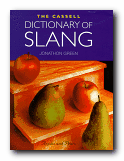 Cassell’s Dictionary of Slang is a guide to ‘unconventional English’ – as slang and swearing is often called. It contains over 60,000 entries covering slang from all parts of the English-speaking world, including Britain, North America, Australia, New Zealand and South Africa, from Elizabethan times to the present. It gives definitions for the jargon used by criminals in Victorian London to the drugs culture of the modern world.
Cassell’s Dictionary of Slang is a guide to ‘unconventional English’ – as slang and swearing is often called. It contains over 60,000 entries covering slang from all parts of the English-speaking world, including Britain, North America, Australia, New Zealand and South Africa, from Elizabethan times to the present. It gives definitions for the jargon used by criminals in Victorian London to the drugs culture of the modern world.
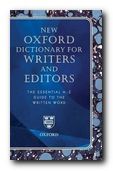 Dictionary for Writers & Editors is a specialist dictionary for writers, journalists, and text-editors. It offers rulings on words and spellings which are commonly problematic (Muslim or Moselm, gypsy or gipsy?); the names of people and places; foreign words and phrases we commonly use (petit-bourgeois); abbreviations; capitalization and punctuation. Covers the difference between hyphens and dashes and acts as a potted encyclopedia for historical names.
Dictionary for Writers & Editors is a specialist dictionary for writers, journalists, and text-editors. It offers rulings on words and spellings which are commonly problematic (Muslim or Moselm, gypsy or gipsy?); the names of people and places; foreign words and phrases we commonly use (petit-bourgeois); abbreviations; capitalization and punctuation. Covers the difference between hyphens and dashes and acts as a potted encyclopedia for historical names.
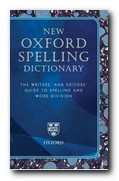 The Spelling Dictionary from Oxford University Press is a dictionary in which the meanings of words are not included. What you have instead is an account of how the word is spelled (or spelt) any variant spellings it might have, and how it is used in different parts of speech. Each entry also shows where the major and minor words breaks should occur in the case of its being hyphenated.
The Spelling Dictionary from Oxford University Press is a dictionary in which the meanings of words are not included. What you have instead is an account of how the word is spelled (or spelt) any variant spellings it might have, and how it is used in different parts of speech. Each entry also shows where the major and minor words breaks should occur in the case of its being hyphenated.
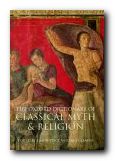 The Dictionary of Classical Myth and Religion is a comprehensive A to Z reference to the classical world. In addition to Greek myths and Roman festivals, it covers Greek and Roman religious places, monuments, religious personnel, divination, astrology and magic, and contains many entries on Judaism and Christianity in Greek and Roman times. Some of the entries are the length of mini-essays.
The Dictionary of Classical Myth and Religion is a comprehensive A to Z reference to the classical world. In addition to Greek myths and Roman festivals, it covers Greek and Roman religious places, monuments, religious personnel, divination, astrology and magic, and contains many entries on Judaism and Christianity in Greek and Roman times. Some of the entries are the length of mini-essays.
© Roy Johnson 2009
More on dictionaries
More on language
More on literary studies
More on writing skills
